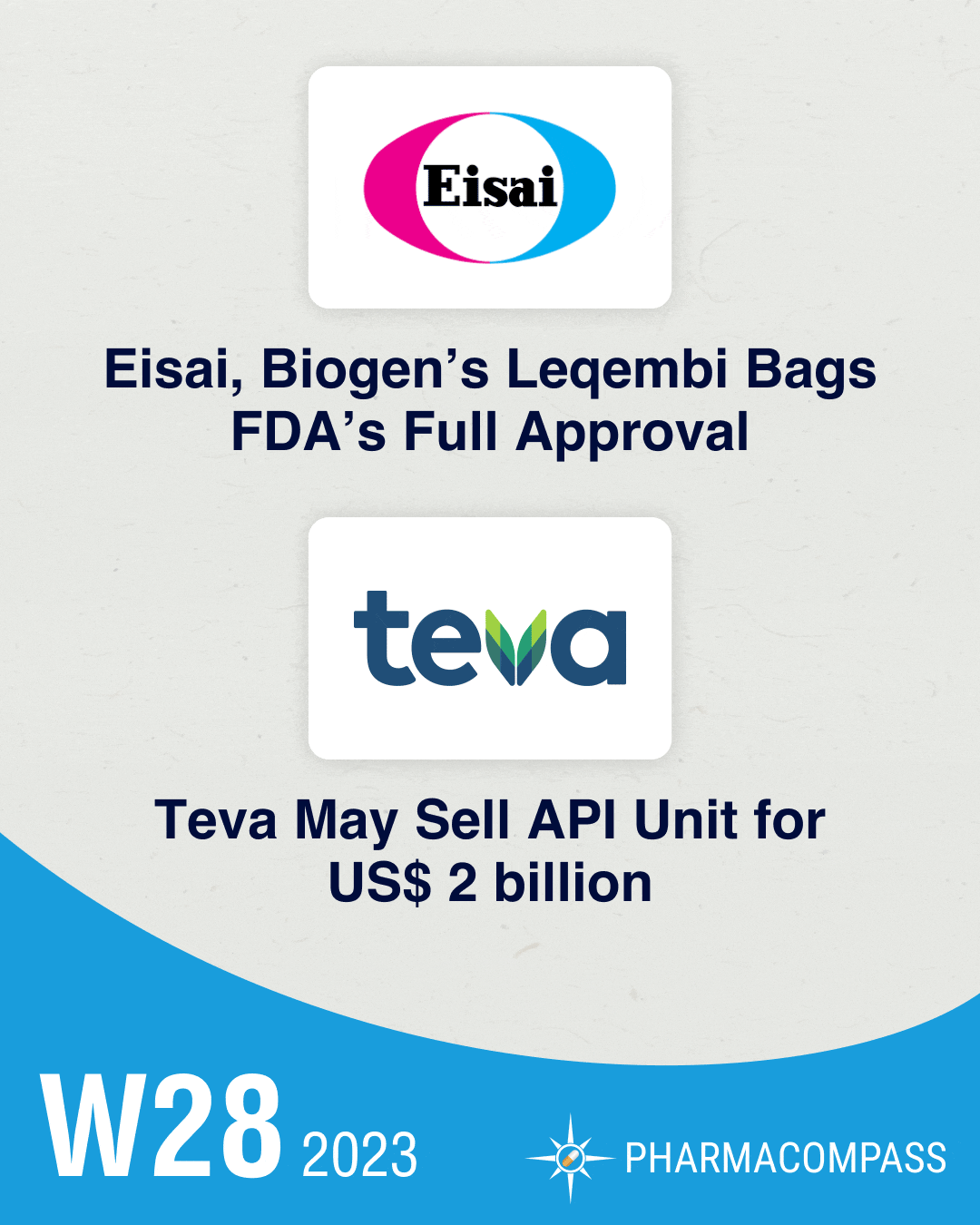
By PharmaCompass
2023-07-13
Impressions: 1,827 Article || 1 Video
Eisai and Biogen’s Alzheimer’s drug — Leqembi — has bagged US Food and Drug Administration’s full approval. This makes Leqembi the first treatment to receive full approval for the condition.
BMS’ Opdivo and chemotherapy improved progression-free survival in bladder cancer patients in a phase 3 trial. As the shortage of chemotherapy drugs continues in the US, FDA has cleared the import of an additional 10 lots of cisplatin from China’s Qilu Pharmaceutical.
In deal-related news, generic giant Teva is reportedly considering selling off its active pharmaceutical ingredients (API) unit, valued at around US$ 2 billion.
Bausch + Lomb is clearly on a shopping spree. A week after it acquired some of Novartis’ eye treatments, the company has acquired Johnson & Johnson’s eye and contact lens drops brand Blink for US$ 106.5 million. J&J, on the other hand, has signed a licensing deal with Nanobiotix for its lead product, NBTXR3.
In trial-related news, ADC Therapeutics has halted a mid-stage trial of its experimental blood cancer drug due to the deaths of seven patients. Takeda has voluntarily withdrawn the biologics license application (BLA) for its dengue vaccine, Qdenga, after FDA cited issues with data collection.
And in regulatory news, Indian drugmaker Lupin has received FDA’s Form 483 for violations at its Nagpur plant, while US genetic testing company Illumina was fined US$ 476 million by the European Commission for closing its takeover of cancer test maker Grail before securing EU antitrust approval.
Biogen-Eisai’s Leqembi becomes first med to bag full approval to treat Alzheimer’s
Eisai and Biogen’s Alzheimer’s drug Leqembi has won full approval from the FDA, exactly six months after it received the agency’s accelerated approval. This is the first treatment to have received full approval to treat the condition. FDA’s decision is based on trial data in which the treatment reduced the rate of disease progression by 27 percent in patients in the earliest stages of Alzheimer’s. However, Leqembi will carry a boxed warning flagging the risk of potentially dangerous brain swelling.
Teva considering sale of API unit for US$ 2 billion, says Bloomberg
Generic giant Teva Pharmaceuticals is “weighing options for” its API business, including a possible sale of this unit, a Bloomberg news report has said. Teva’s API business could be worth around US$ 2 billion. The Israeli drugmaker is working with advisors to gauge interest in its API unit, the report added. The discussions are at a nascent stage. The API unit of Teva includes more than 400 APIs utilized in various drugs and employs over 5,000 staff. Earlier in May, Teva's newly appointed CEO, Richard Francis, announced a plan to trim generic drug production due to low profits and shift focus to developing complex, high-value products.
EMA to review safety of Novo’s Ozempic, Saxenda post adverse reports from Iceland
The European Medicines Agency (EMA) will review the safety of Novo Nordisk’s diabetes drug Ozempic (semaglutide) and weight-loss treatment Saxenda (liraglutide) after Iceland’s health regulator reported three cases of suicidal thoughts and self-harm in patients taking these drugs. EMA will also examine the safety of all GLP-1 receptor agonists, including Novo’s weight-loss treatment Wegovy. Novo, however, said its own safety monitoring has so far found no “causal association” between the drugs and such thoughts.
BMS’ blockbuster drug Opdivo extends survival in late-stage bladder cancer trial
In a phase 3 trial, Bristol Myers Squibb’s blockbuster cancer drug Opdivo (nivolumab), along with cisplatin-based chemotherapy, improved survival in bladder cancer patients. Opdivo and chemotherapy were followed by Opdivo monotherapy.
FDA allows further imports of chemo drug from China: In May, FDA had authorized temporary importation of an unapproved chemotherapy drug (cisplatin injections) from China’s Qilu Pharmaceutical to alleviate an acute shortage of cancer drugs in the US. With the shortage of chemo drugs continuing, FDA has now cleared 10 more lots of cisplatin for shipment to the US from Qilu Pharma.
After buying Novartis’ eye drugs, Bausch + Lomb acquires J&J’s eye drops brand
A week after Bausch + Lomb acquired some of Novartis’ eye treatments, including Xiidra, for up to US$ 2.5 billion, it acquired Johnson & Johnson’s eye and contact lens drops brand Blink for US$ 106.5 million in cash.
J&J signs deal with Nanobiotix: J&J has inked a licensing deal with Nanobiotix for its lead product, NBTXR3, for US$ 30 million in cash. The deal also includes milestone payments of up to US$ 1.8 billion and gives J&J global rights to NBTXR3, a first-in-class radio enhancer for solid tumors that is currently in phase 3 trials for head and neck cancer.
ADC Therapeutics halts blood cancer trial after deaths of seven patients
ADC Therapeutics has stopped patient enrolments for a mid-stage trial of its experimental cancer drug Zynlonta, following the deaths of seven patients. Five other patients developed respiratory issues. The company, however, said 11 of the 12 adverse events were unrelated to the drug.
The phase 2 study was evaluating Zynlonta in combination with rituximab in 40 patients with previously untreated diffuse large B-cell lymphoma (DLBCL), a type of blood cancer.
Takeda withdraws its application for dengue vaccine in US: Takeda has voluntarily withdrawn the biologics license application (BLA) for its dengue vaccine, Qdenga, following discussions with the FDA where the health regulator cited issues with data collection. The vaccine is already approved in Europe, the UK, and other countries. Sanofi’s Dengvaxia is the only approved dengue vaccine for use in children and teens (six to 16 years of age).
Lupin’s India plant receives FDA’s Form 483 with two observations
Indian drugmaker Lupin has received FDA’s Form 483 with two observations due to violations of the Food Drug and Cosmetic (FD&C) Act and other regulations. The agency conducted an inspection at Lupin’s solid dosage facility in Nagpur (India) from July 3 to 11. Lupin has assured that it will resolve these issues.
Earlier this week, Lupin received an Establishment Inspection Report (EIR) from FDA for its Pithampur Unit-2 facility, which manufactures oral solids and ophthalmic dosage forms.
Illumina fined US$ 476 million by EC: The European Commission has fined US genetic testing company Illumina US$ 476 million (Euro 432 million) for closing its takeover of cancer test maker Grail before securing EU antitrust approval.
The PharmaCompass Newsletter – Sign Up, Stay Ahead
Feedback, help us to improve. Click here
Image Credit : Phisper Infographic by PharmaCompass license under CC BY 2.0
“ The article is based on the information available in public and which the author believes to be true. The author is not disseminating any information, which the author believes or knows, is confidential or in conflict with the privacy of any person. The views expressed or information supplied through this article is mere opinion and observation of the author. The author does not intend to defame, insult or, cause loss or damage to anyone, in any manner, through this article.”








